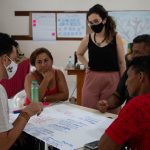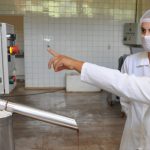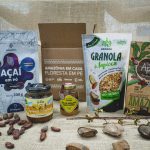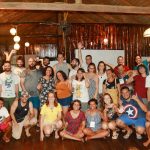[:pb]Por Juliana Nogueira e Mônica Ribeiro
Foto: Divulgação/Idesam
Uma rodada de negócios que vai desembolsar R$ 1,1 milhão para aceleração de quatro pequenos negócios sustentáveis com base na Amazônia encerrou o 1º Fórum de Investimentos de Impacto e Negócios Sustentáveis na Amazônia (FIINSA) nesta quarta-feira, (14/11), realizado pela Plataforma Parceiros pela Amazônia (PPA). Outros quatro receberam o Prêmio PPA com investimento de R$ 60.000,00 para alavancar quatro negócios: Sustente, Onisafra, Da Tribu e Broto.
O encontro, que reuniu grandes empresas, investidores, ONGs e empreendedores de estados amazônicos promoveu uma competição em que representantes das quatro empresas selecionadas entre mais de 80, enfrentaram o desafio de apresentar seus negócios em apenas 5 minutos para investidores como Sitawi, Nesst, Conexus e Bemol.
>> Saiba mais sobre a seleção dos negócios realizada por PPA e Pipe Social.
Além de apresentar seus negócios “ao vivo” , os empreendedores da Encauchados de Vegetais da Amazônia, Manioca, Peabiru Produtos da Floresta e Ração+ tiveram que responder aos questionamentos dos “sharks” (tubarões), que foram bem detalhistas – queriam saber de planos de crescimento a como iriam aumentar seu impacto socioambiental. Depois da sessão de negociação, os empreendedores saíram felizes e com muitos aplausos da plateia.
Joanna Reis, fundadora da Manioca, que trabalha com alimentos de alta qualidade, ficou emocionada ao receber o investimento: “É toda uma história para chegar aqui. Muito obrigada. Posso prometer que toda a equipe da Manioca estará muito focada em trabalhar nisso”, disse receber a proposta de investimento de R$200 mil.
Aprendizados
Dentre os desafios apontados, estão: (1) a pouca disponibilidade de capital de impacto, (2) a necessidade de políticas públicas que atendam às necessidades das comunidades produtivas da região, (3) a qualificação associada a pesquisa e desenvolvimento, (4) necessidade de ampliar iniciativas de incubação e aceleração de negócios, (5) necessidade de maior conexão entre os atores do ecossistema, (6) logística e infraestrutura, (7) violência no campo, (8) necessidade de mudança da cultura empreendedora em relação à pecuária e madeira, (9) alavancar mais negócios na chamada “Amazônia profunda” com mais envolvimento das comunidades tradicionais.
Já as oportunidades incluem: (1) público crescente disposto a consumir produtos com a marca Amazônia e ligados à sociobiodiversidade, e conservação da biodiversidade (2) novos recursos e modelos de financiamento chegando, (3) uma nova geração que assume os negócios com olhar mais apurado para estas questões e aberta a mudar.
“A realização de um evento como o FIINSA em Manaus é muito importante. Normalmente os eventos dessa natureza são realizados no sudeste, ou em Brasília. Esse Fórum abre uma agenda que deve ser tornar cada vez mais perene e contribuir mais e mais para que investimentos de impacto e negócios sustentáveis tenham condições para se desenvolver na Amazônia”, afirma Mariano Cenamo, pesquisador do Idesam e coordenador geral do Fórum.
A Amazônia gera menos de 8% do PIB de todo o Brasil, e os negócios de impacto podem ajudar a virar esse jogo e ainda proteger a floresta. O que não será possível sem melhorar a vida das pessoas que nela vivem.
No FIINSA, entre 13 a 14 de novembro, estiveram reunidas mais cerca de 290 pessoas de diversos estados da Amazônia para debater investimento negócios de impacto na região, buscando a conexão entre os atores desse ecossistema: empreendedores, investidores, aceleradoras, incubadoras, empresas, institutos, fundações e academia. Todos com o mesmo propósito de fomentar e alavancar negócios focados na valorização da sociobiodiversidade na conservação da biodiversidade, envolvendo comunidades tradicionais e buscando novos paradigmas para o desenvolvimento territorial sustentável.
Deste público, cerca de 80% veio a Manaus em busca de conexões e networking e mais de 50% já fez negócios na Amazônia. O FIINSA deve ter uma próxima edição em 2019 ou 2020, e até lá o desafio é manter a conexão permanente entre todos para o fortalecimento do campo.
Palestras
Também durante o FIINSA foi lançado o estudo Investimento de Impacto na Amazônia – Caminhos para o Desenvolvimento Sustentável, que buscou identificar mecanismos de investimento, tipos de empreendimento, cadeias de valor, obstáculos e oportunidades ao investimento na região.
“É preciso atrair mais atores, que precisam ser mais realistas para lidar com as especificidades da região”, explicou Leonardo Letelier, da Sitawi, que realizou o estudo.
Investidores querem escala, valor, tecnologia, inovação e impacto. Além, e claro, de retorno financeiro. Para os empreendedores, o importante e o compromisso de quem investe com o negocio nascente, como explicou Laurent Micol, da Pesca (especializada em recuperar pastos degradados e promover pecuária sustentável em Mato Grosso): “A gente se embala, quer fazer uma coisa grande, com os indicadores que o investidor quer ver. Mas se pudesse começar de novo, faríamos a metade dos 10 mil hectares que temos hoje, no dobro do tempo”.
A marca Amazônia também foi lembrada como uma grande oportunidade, mas para Raphael Medeiros, diretor-executivo do Centro de Empreendedorismo da Amazônia “os produtos têm que ser bem vestidos (embalagens) e ter certificação”. Pela distancia, chegam mais caros aos mercados, mas o foco tem que ser o impacto socioambiental e a qualidade que chega ao consumidor”. Depois de vários ciclos de exploração de recursos naturais que não deixaram riqueza, “esta claro que o caminho e o do comercio justo, com impactos positivos sobre a floresta e sobre as pessoas”.
Sobre a PPA
A Plataforma de Parceiros pela Amazônia (PPA) nasceu com o objetivo de liderar a construção de soluções inovadoras para o desenvolvimento sustentável na Amazônia junto a empresas e o setor privado, priorizando investimentos em negócios de impacto socioambiental. Na prática, a PPA atua na incubação e aceleração de empreendedores, na realização de estudos estratégicos para ampliação de investimentos e por meio da parcerias entre empresas, comunidades e governos.
Atualmente, a coordenação executiva da PPA é exercida pelo Instituto de Conservação e Desenvolvimento Sustentável da Amazônia (IDESAM), a Agência dos Estados Unidos para o Desenvolvimento Internacional (USAID), Centro Internacional de Agricultura Tropical (CIAT), a Equipe de Conservação da Amazônia (ECAM) e o Instituto Peabiru.[:en]
By Juliana Nogueira e Mônica Ribeiro
Photo: Media/Idesam
Translated by Felipe Sá
Organized by the Partnership Platform for the Amazon (PPA), the 1st Impact Investing and Sustainable Businesses Forum in the Amazon (FIINSA, in Portuguese) ended this Wednesday (11/14) with a business round that will disburse R$1.1 million in accelerating four small sustainable businesses based in the Amazon. Four other businesses received the PPA Award, each receiving an investment of R$60,000.00 to boost their activities: Sustente, Onisafra, Da Tribu and Broto.
The event gathered major companies, investors, NGOs and entrepreneurs from the Amazon states and hosted a shark tank in which the representatives of four companies selected among over 80 faced the challenge to introduce their businesses in only 5 minutes to investors (‘sharks’) such as Sitawi, Nesst, Conexus and Bemol.
>> Get to know more about the business selection carried out by PPA and Pipe Social.
In addition to presenting live their businesses, the entrepreneurs from ‘Encauchados de Vegetais da Amazônia’, ‘Manioca’, ‘Peabiru Produtos da Floresta’ and ‘Ração+’ had to answer the questions the sharks made – which were quite detailed. They wanted to know about growth plans and how they could enhance their socioenvironmental impact. After the negotiation round, the entrepreneurs left the stage happy and acclaimed by the audience.
Joanna Reis, founder of ‘Manioca’, that works with high quality food, was thrilled to receive the investment: “There is a whole history until I get here. Thank you very much. I can promess that the entire Manioca team will be pretty focused in working on this”, she said after getting the R$200 thousand investment proposal.
Learning
Among the challenges that were pointed out, there are: (1) little availability of capital for impact investing, (2) the need for public policies that meet the demands from the region’s productive communities, (3) qualification associated to research and development, (5) the need for greater connection between the actors of this ecosystem, (6) logistics and infrastructure, (7) violence in rural areas, (8) the need of changing the entrepreneurship culture in relation to livestock and timber and (9) leveraging more businesses in the “Amazônia Profunda” (Deep Amazon, in English) open call involving more traditional communities.
The opportunities include, (1) growing public willing to consume products that are related to the Amazon brand, to sociobiodiversity, and biodiversity conservation, (2) new resources and financing models arriving, (3) a new generation that takes businesses having these issues in mind and open to change.
“Making an event like FIINSA in Manaus is really important. Usually, events of this nature are held in the southeast or in Brasília. This Forum introduces an agenda that should become increasingly lasting and contribute more and more in order to assure that impact investing and sustainable business have the conditions to develop in the Amazon”, states Mariano Cenamo, Idesam’s senior researcher and general coordinator of the Forum.
The Amazon is responsible for less than 8% of Brazil’s GDP, and impact businesses can help changing this landscape and also protect the forest. What won’t be possible without improving the lives of those who live there.
During the FIINSA, that took place in November 13th and 14th, over 290 people from different states of the Amazon got together to debate impact investing and business in the region, looking for connections between actors from this ecosystem: entrepreneurs, investors, accelerators, incubators, companies, institutes, foundations and the academy. All with the same purpose of fostering and leveraging businesses focused in the promotion of sociobiodiversity in the conservation of biodiversity, involving traditional communities and seeking new paradigms for the sustainable territory development.
80% of the attendees came to Manaus in search of connections and networking, and over 50% have already made business in the Amazon. FIINSA’s next edition should take place in 2019 or 2020 and, until then, the challenge is to keep the connections permanently to strengthen the field.
Lectures
Also during the FIINSA, the study “Impact Investing in the Amazon – Paths for the Sustainable Development” was launched. It identifies the investing mechanisms, types of enterprise, value chains, obstacles and opportunities for investments in the region.
“New actors must be attracted. They need to be more down-to-earth when dealing with the region’s specificities”, explained Leonardo Letelier, from Sitawi, that carried the study out.
Investors want scale, value, technology, innovation and impact. Besides, obviously, financial return. For entrepreneurs, what matters is the commitment of who invest with the new business, as Laurent Micol, from Pesca (specialized in recovering degraded pastures and promoting sustainable cattle-raising in Mato Grosso state), explained: “We get things going, we want to make something great with the indicators the investor demanded. But if we could start over, we would do half of 10 thousand hectares that we have today, twice as fast”.
The Amazon brand was also reminded as a great opportunity, but Raphael Medeiros, executive director of the Centre for Entrepreneurship in the Amazon (Centro de Empreendedorismo da Amazônia, in Portuguese) highlights: “the products need to be well packed and have certification. Due to the distance, they arrive more expensive to the market, but the focus must be the socioenvironmental impact and the quality that is delivered to the consumer”. After multiple cycles of natural resources exploration that didn’t leave wealth, “it is clear that the pat to take is of the fair trade, with positive impact on forests and people”.
About PPA
The Partnership for the Amazon Platform (PPA) was created to lead the development of innovative solutions for the sustainable development of the Amazon along with the private sector, prioritizing investments in businesses with socioenvironmental impact. PPA works as an incubator and accelerator for entrepreneurs, carrying out strategic studies to expand investments and partnering with businesses, communities and governments.
Currently, PPA’s executive coordination is carried out by the Institute of Conservation and Sustainable Development of the Amazon (IDESAM), the United States Agency for International Development (USAID), the International Center for Tropical Agriculture (ICTA), the Amazon Conservation Team (Equipe de Conservação da Amazônia, in Portuguese) and the Peabiru Institute.[:]





